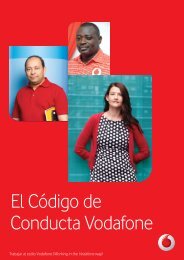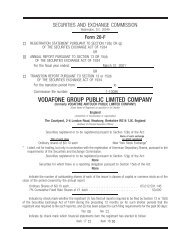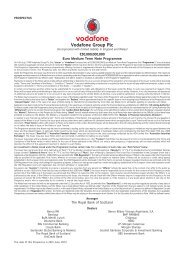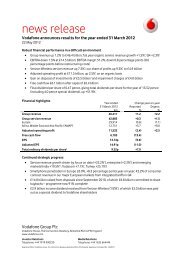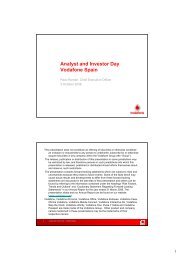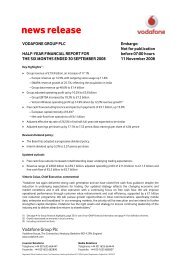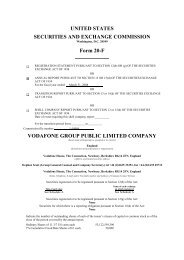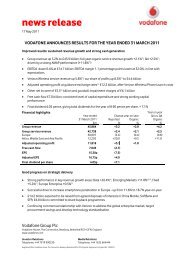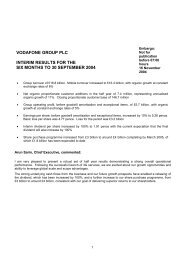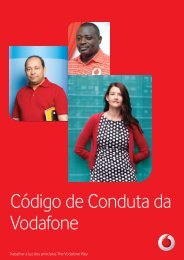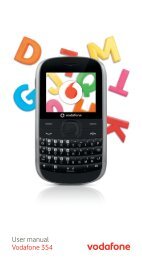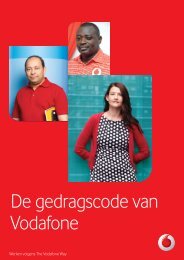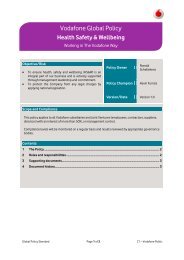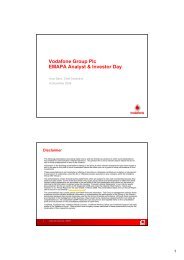Create successful ePaper yourself
Turn your PDF publications into a flip-book with our unique Google optimized e-Paper software.
Performance in <strong>the</strong> 2008 financial year<br />
Access to communications<br />
Access to communications offers <strong>the</strong> single greatest opportunity for <strong>Vodafone</strong><br />
to make a strong contribution to society, with a considerable body of research<br />
showing that telecommunications – and mobile communications in particular –<br />
has <strong>the</strong> potential to change people’s lives for <strong>the</strong> better, by promoting economic<br />
and social development. During <strong>the</strong> 2008 financial year, <strong>Vodafone</strong> continued<br />
its focus on mobile payment services and own brand handsets for emerging<br />
markets as follows:<br />
•<br />
•<br />
<strong>Vodafone</strong> has continued with <strong>the</strong> ambition of extending access to<br />
communications in emerging markets by increasing <strong>the</strong> portfolio of own<br />
branded handsets that introduce higher levels of technological development<br />
and affordability so that more people are able to use more services. The Group<br />
has shipped more than 10 million of <strong>the</strong>se new handsets to more than 30<br />
markets during <strong>the</strong> 2008 financial year.<br />
Over two million people in Kenya have used <strong>the</strong> <strong>Vodafone</strong> M-PESA/<strong>Vodafone</strong><br />
Money Transfer mobile transaction service since its launch in February 2007,<br />
with an average of 200,000 more signing up each month. Customers can pay<br />
in and withdraw cash at local agents, transfer money to o<strong>the</strong>r mobile users<br />
via SMS and buy prepaid airtime credit. <strong>Vodafone</strong> M-PESA/<strong>Vodafone</strong> Money<br />
Transfer is being used by customers for a wide range of money transfer<br />
transactions, with <strong>the</strong> majority of transaction values being below €20.<br />
Partnering with local mobile operator Roshan, <strong>Vodafone</strong> is piloting a similar<br />
scheme in Afghanistan and plans fur<strong>the</strong>r launches in India and in o<strong>the</strong>r<br />
African countries.<br />
The Group is also finding ways to make mobile phones easier to use, particularly<br />
for customers who are elderly, deaf, hard of hearing, blind, visually impaired or have<br />
o<strong>the</strong>r disabilities. Examples include a speaking phone for <strong>the</strong> visually impaired<br />
and special data tariffs for deaf customers. The Group is currently conducting<br />
a strategic review of how best to address those issues and will announce <strong>the</strong><br />
development of a centre of excellence during <strong>the</strong> 2009 financial year.<br />
Safe and trusted internet experience<br />
<strong>Vodafone</strong>’s reputation depends on earning and maintaining <strong>the</strong> trust of its<br />
customers. The way <strong>the</strong> Group deals with certain key consumer issues directly<br />
impacts trust in <strong>Vodafone</strong>. These include responsible marketing, clear pricing,<br />
protecting customers’ privacy and developing a mobile advertising proposition<br />
that customers find acceptable. During <strong>the</strong> year, <strong>Vodafone</strong> has re-drafted its<br />
responsible marketing guidelines to ensure that customers can continue to trust<br />
<strong>the</strong> Group’s services in new areas such as mobile advertising, social networking<br />
and digital marketing.<br />
Age-restricted content<br />
During <strong>the</strong> 2008 financial year, <strong>the</strong> Group’s research has shown that parents are<br />
increasingly concerned about what <strong>the</strong>ir children see on <strong>the</strong> internet and it is<br />
anticipated that those concerns will be transferred to children’s use of mobile<br />
devices as parents become more aware of mobile internet.<br />
<strong>Vodafone</strong>’s initiatives in <strong>the</strong>se areas include:<br />
•<br />
•<br />
•<br />
•<br />
<strong>Vodafone</strong> – Performance<br />
Corporate Responsibility continued<br />
All mobile operating companies that offer age-restricted content have<br />
implemented parental controls. These block access to age-restricted content<br />
on <strong>the</strong> <strong>Vodafone</strong> live! domain to those under 18 years of age. Internet filters<br />
are offered by eight operating companies, which also enable parents to prevent<br />
<strong>the</strong>ir children accessing inappropriate age-restricted content on <strong>the</strong> internet<br />
via <strong>the</strong>ir mobile phones. The mobile operating companies that have not<br />
implemented <strong>the</strong> filter will remove individual access to <strong>the</strong> internet completely<br />
on request.<br />
<strong>Vodafone</strong> is leading a pan-European ICT Education Initiative in partnership with<br />
o<strong>the</strong>r ICT companies and European Schoolnet, to develop online education<br />
resources. These will help teachers understand new mobile and internet<br />
technology and encourage <strong>the</strong>ir students to use it responsibly.<br />
<strong>Vodafone</strong> is a founding member of <strong>the</strong> Mobile Alliance against Child Sexual<br />
Abuse Content, launched by <strong>the</strong> GSMA in February 2008 to prevent users from<br />
accessing websites identified as hosting child sexual abuse content.<br />
A representative from <strong>Vodafone</strong> chaired <strong>the</strong> UK Home Office taskforce to<br />
develop industry guidelines on social networking. <strong>Vodafone</strong> will develop its<br />
own social networking guidelines for operating companies based on <strong>the</strong><br />
industry guidelines to inform <strong>the</strong> way access is offered to services like Bebo,<br />
Facebook, Flickr, MySpace and YouTube.<br />
60 <strong>Vodafone</strong> Group Plc Annual Report 2008<br />
Privacy and freedom of expression<br />
In response to concerns raised about privacy and freedom of expression on <strong>the</strong><br />
internet, <strong>Vodafone</strong> continued to participate in a multi-stakeholder engagement<br />
initiative to agree principles for companies on <strong>the</strong>se issues. More than 20<br />
academics, investors, companies and non-governmental organisations are now<br />
involved in this process.<br />
The Group launched mobile advertising activities in 11 markets, adopting a<br />
conservative approach to content and privacy issues. <strong>Vodafone</strong> has begun to<br />
monitor conformance with <strong>the</strong> Group’s global guidance on advertising and is<br />
reviewing feedback on areas where <strong>the</strong> guidance should be clarified, adapted<br />
or modified.<br />
Climate change<br />
<strong>Vodafone</strong> recognises that climate change is likely to result in profound<br />
consequences for <strong>the</strong> environment, society and <strong>the</strong> economy. Limiting <strong>the</strong><br />
Group’s contribution is a priority and during <strong>the</strong> year <strong>the</strong> Group announced that<br />
by 2020 it will reduce its CO 2 emissions by 50% against <strong>the</strong> 2007 financial year<br />
baseline of 1.23 million tonnes. The Group is currently ga<strong>the</strong>ring data about <strong>the</strong><br />
carbon footprint of its newly acquired businesses in India and Turkey, and climate<br />
change targets for <strong>the</strong>se businesses will be announced in due course.<br />
The Group reviewed <strong>the</strong> options for achieving this target, including carbon offsetting<br />
as a last resort, and concluded that <strong>the</strong> most effective strategy is to cut<br />
CO 2 emissions directly. The target is expected to be achieved principally through<br />
operational changes and technological innovation to improve energy efficiency<br />
in <strong>the</strong> networks. Renewable energy will be used when and where possible.<br />
In addition, as part of <strong>the</strong> climate strategy, <strong>the</strong> Group announced that it will also<br />
be focusing on developing products and services which will help customers limit<br />
<strong>the</strong>ir own emissions. This is expected to include exploring consumer related<br />
solutions such as solar-powered or universal chargers as well as improving<br />
understanding of how mobile technology can enable lower emissions through<br />
more efficient traffic management, logistic planning and scheduling and <strong>the</strong><br />
remote monitoring of utility meters.<br />
Energy use associated with <strong>the</strong> operation of <strong>the</strong> network accounts for around<br />
80% of <strong>the</strong> Group’s carbon dioxide emissions. In 2006, <strong>the</strong> Group set a target to<br />
reduce CO 2 emissions per unit of data transmitted by 40% by 2011. This target<br />
has been achieved in 2008, three years in advance, with network carbon dioxide<br />
emissions per unit of data transmitted decreasing by 50% from 0.034 Kg/Mb to<br />
0.17 Kg/Mb. In <strong>the</strong> 2008 financial year, <strong>Vodafone</strong>’s energy use was 2,996 GWh,<br />
equating to 1.45 million tonnes of carbon dioxide.<br />
Sustainable products and services<br />
<strong>Vodafone</strong> is developing programmes aimed at making delivery of its products and<br />
services more sustainable. The key focus during <strong>the</strong> 2008 financial year was on<br />
<strong>the</strong> reuse and recycling of handsets and accessories, and network equipment.<br />
Mobile phones, accessories and <strong>the</strong> networks on which <strong>the</strong>y operate require<br />
upgrading, replacement and decommissioning. The Group complies with <strong>the</strong> EU’s<br />
Waste Electronic and Electrical Equipment directive through its handset recycling<br />
programmes in all operating companies where it applies. The Group has also<br />
worked with suppliers to ensure substances prohibited by <strong>the</strong> ‘Restriction of <strong>the</strong><br />
use of certain Hazardous Substances’ directive are phased out. During <strong>the</strong> 2008<br />
financial year, 1.33 million phones were collected for reuse and recycling through<br />
collection programmes in 16 mobile operating companies, achieving <strong>the</strong> Group’s<br />
target. 11,849 tonnes of network equipment waste was generated, with 96% of<br />
this sent for reuse or recycling, exceeding <strong>the</strong> target of 95%.<br />
Mobile phones, masts and health<br />
<strong>Vodafone</strong> recognises that <strong>the</strong>re is public concern about <strong>the</strong> safety of Radio<br />
Frequency (“RF”) fields from mobile phones and base stations. The Group<br />
contributes to funding of independent scientific research to resolve scientific<br />
uncertainty in areas identified by <strong>the</strong> World Health Organisation (“WHO”). The<br />
WHO established an International EMF Project in 1996, which records global<br />
research into mobile phones, masts and health and prioritises research needs.<br />
In 2006, <strong>the</strong>y identified <strong>the</strong> following three main areas for additional research:<br />
long term (more than 10 years) exposure to low-level RF fields, possible health<br />
effects of mobile use in children and dosimetry (<strong>the</strong> way levels of RF absorbed<br />
are calculated).



